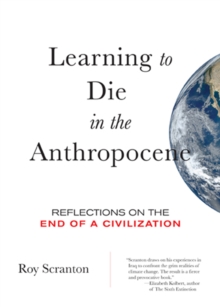Description
| Product ID: | 9780872866690 |
| Product Form: | Paperback / softback |
| Country of Manufacture: | US |
| Series: | City Lights Open Media |
| Title: | Learning to Die in the Anthropocene |
| Subtitle: | Reflections on the End of a Civilization |
| Authors: | Author: Roy Scranton |
| Page Count: | 144 |
| Subjects: | Social and political philosophy, Social & political philosophy, Sociology, Political structure and processes, Sociology, Political structure & processes |
| Description: | Select Guide Rating An Iraq War vet's bracing, visionary response to the challenge posed by global warming and his hope in the humanities. "In Learning to Die in the Anthropocene, Roy Scranton draws on his experiences in Iraq to confront the grim realities of climate change. The result is a fierce and provocative book."--Elizabeth Kolbert, Pulitzer Prize-winning author of The Sixth Extinction: An Unnatural History "Roy Scranton''s Learning to Die in the Anthropocene presents, without extraneous bullshit, what we must do to survive on Earth. It''s a powerful, useful, and ultimately hopeful book that more than any other I''ve read has the ability to change people''s minds and create change. For me, it crystallizes and expresses what I''ve been thinking about and trying to get a grasp on. The economical way it does so, with such clarity, sets the book apart from most others on the subject."--Jeff VanderMeer, author of the Southern Reach trilogy "Roy Scranton lucidly articulates the depth of the climate crisis with an honesty that is all too rare, then calls for a reimagined humanism that will help us meet our stormy future with as much decency as we can muster. While I don''t share his conclusions about the potential for social movements to drive ambitious mitigation, this is a wise and important challenge from an elegant writer and original thinker. A critical intervention."--Naomi Klein, author of This Changes Everything: Capitalism vs. the Climate "Concise, elegant, erudite, heartfelt & wise."--Amitav Ghosh, author of Flood of Fire "War veteran and journalist Roy Scranton combines memoir, philosophy, and science writing to craft one of the definitive documents of the modern era."--The Believer Best Books of 2015 Coming home from the war in Iraq, US Army private Roy Scranton thought he''d left the world of strife behind. Then he watched as new calamities struck America, heralding a threat far more dangerous than ISIS or Al Qaeda: Hurricane Katrina, Superstorm Sandy, megadrought--the shock and awe of global warming. Our world is changing. Rising seas, spiking temperatures, and extreme weather imperil global infrastructure, crops, and water supplies. Conflict, famine, plagues, and riots menace from every quarter. From war-stricken Baghdad to the melting Arctic, human-caused climate change poses a danger not only to political and economic stability, but to civilization itself . . . and to what it means to be human. Our greatest enemy, it turns out, is ourselves. The warmer, wetter, more chaotic world we now live in--the Anthropocene--demands a radical new vision of human life. In this bracing response to climate change, Roy Scranton combines memoir, reportage, philosophy, and Zen wisdom to explore what it means to be human in a rapidly evolving world, taking readers on a journey through street protests, the latest findings of earth scientists, a historic UN summit, millennia of geological history, and the persistent vitality of ancient literature. Expanding on his influential New York Times essay (the #1 most-emailed article the day it appeared, and selected for Best American Science and Nature Writing 2014), Scranton responds to the existential problem of global warming by arguing that in order to survive, we must come to terms with our mortality. Plato argued that to philosophize is to learn to die. If that’s true, says Scranton, then we have entered humanity’s most philosophical age--for this is precisely the problem of the Anthropocene. The trouble now is that we must learn to die not as individuals, but as a civilization. Roy Scranton has published in the New York Times, Wall Street Journal, Rolling Stone, Boston Review, and Theory and Event, and has been interviewed on NPR''s Fresh Air, among other media. |
| Imprint Name: | City Lights Books |
| Publisher Name: | City Lights Books |
| Country of Publication: | GB |
| Publishing Date: | 2015-10-22 |


